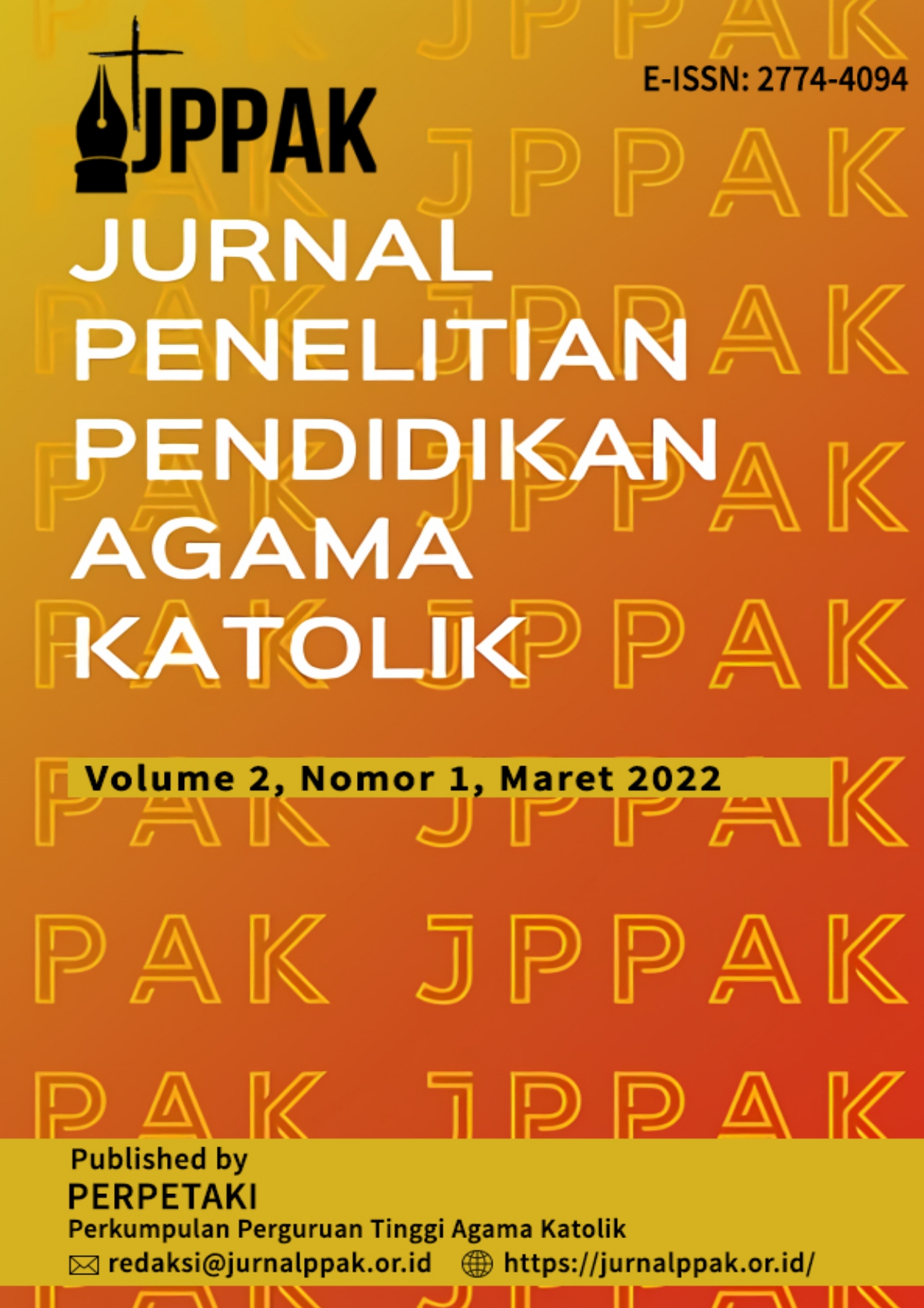Memaknai Doa Bersama dalam Komunitas sebagai Dasar Pelayanan Pastoral oleh Pengasuh bagi Kaum Disabilitas
DOI:
https://doi.org/10.52110/jppak.v2i1.44Keywords:
Prayer together; community; pastoral ministry, disabilityAbstract
Surviving and gathering healthily every day, living in communion, eating together, and praising God (Acts 2:41-47) is the way of life of the Early Church. What we want to highlight in this article is a common prayer in the community and how it animates caregivers in all parenting patterns to children/people with special needs. Prayer and community life are typical of Catholics, especially caregivers of the community of ALMA. The aim of the study is to explore the influence of shared prayer in caregiver communities on pastoral care for children/people with special needs. The method used is quantitative inferensial. Quantitative approach used as a step to prove the relationship between variables. Free variables are the common prayers in society, while bound variables are the caregiver services. The population is all caregivers / nurses of children with special needs in Komplek Dieng No. 40, Malang (30 children). Sampling technique used is non probability sampling technique, meaning the entire population was sampled for the study. SPSS version 16 software is used by authors to process data and see the influence between two variables. The level is significant at 5%. The results obtained: 1) The r-table value of 30 samples for free and bound variables is 0.361; 2) free variable reliability test results 0.797>0.6 Cronbach alpa value; while the variable is bound to 0.672; 3) The r-calculated value is v-free and v-bound 0.138931> r-table 0.361. So, H0 was rejected and H1 accepted. As such, there is a positive and significant relationship between shared prayer in the community and caregiver services; 4) Based on a simple linear regression analysis, the constant value of the non-standard coefficient is 32.188, while the regression coefficient value is 0.073. In conclusion, prayer together in the community has a positive effect on caregiver services in the community.
Downloads
##submission.downloads##
Submitted
Accepted
Published
How to Cite
Issue
Section
License
Copyright (c) 2022 Fabianus Selatang, Melfiani Merlin, Witria Wanda, Theresia Mando Tato

This work is licensed under a Creative Commons Attribution-ShareAlike 4.0 International License.
Copyright Notice and Permissions
Jurnal Penelitian Pendidikan Agama Katolik offers immediate open access to all its content on the principle to make researches freely available to the public, especially to the scholars, to support greater global exchanges of knowledge. This journal encourages all scholarly authors to allow their research openly available, free access and without time restrictions.
All articles published Open Access will be immediately and permanently free for everyone to read and download. Under the CC BY-SA 4.0 license, authors retain ownership of the copyright for their article, however authors grant others permission to use the content of publications in Jurnal Penelitian Pendidikan Agama Katolik (JPPAK) in whole or in part provided that the original work is properly cited. Users (redistributors) of Jurnal Penelitian Pendidikan Agama Katolik (JPPAK) are required to cite the original source by including at least: the full title of the article, the author's or authors' full name(s), JPPAK as the initial source of publication, year of publication and volume number using a propriate citing method.
Copyright encompasses exclusive rights to reproduce and deliver the article in all form and media, including reprints, photographs, microfilms and any other similar reproductions, as well as translations. The reproduction of any part of this journal, its storage in databases and its transmission by any form or media, such as electronic, electrostatic and mechanical copies, photocopies, recordings, magnetic media is prohibited without consent of Jurnal Penelitian Pendidikan Agama Katolik (JPPAK).
Jurnal Penelitian Pendidikan Agama Katolik (JPPAK) is licensed under a Creative Commons Attribution Share-Alike 4.0 International. (CC BY-SA 4.0)
Authors who publish with Jurnal Penelitian Pendidikan Agama Katolik (JPPAK) agree to the following terms:
- Authors retain copyright and grant the journal right of first publication with the work simultaneously licensed under a Creative Commons Attribution Share-Alike 4.0 International (CC BY-SA 4.0) license that allows others to share the work with an acknowledgement of the work's authorship and initial publication in this journal.
- Authors are able to enter into separate, additional contractual arrangements for the non-exclusive distribution of the journal's published version of the work (e.g., post it to an institutional repository or publish it in a book), with an acknowledgement of its initial publication in this journal.
- Authors are permitted and encouraged to post their work online (e.g., in institutional repositories or on their website) after the publication on JPPAK, as long as it not published on other OJS for it will be treated as plagiarism by plagiarism checker apps. It can lead to productive exchanges, as well as earlier and greater citation of published work (See The Effect of Open Access).












